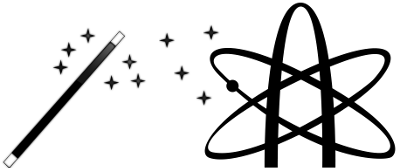 This is the first installment of what is intended as a series on theories (or more strictly speaking, hypotheses) of magic. Theories of magic are of course distinguished from the practice of magic: The goal here is not to describe particular techniques, but rather mechanisms by which magical practices could conceivably work in our present-day industrialized and scientific culture.
This is the first installment of what is intended as a series on theories (or more strictly speaking, hypotheses) of magic. Theories of magic are of course distinguished from the practice of magic: The goal here is not to describe particular techniques, but rather mechanisms by which magical practices could conceivably work in our present-day industrialized and scientific culture.
Before we can get into how magic might work, we must first define what it is we are talking about. Our working definition: Magic is the use of spiritual and ritual activities intended to accomplish some sort of change in the universe. Somebody who attempts to do this is a magician (they may have other titles, fancy hats, and so forth, but for our purposes this simple word will suffice). This activity requires a couple of beliefs about how the universe works in order to be effective:
Both of these beliefs, of course, are completely unproven. And indeed, they are most likely unprovable, for reasons that will be explored throughout this series. Nobody has ever been able to provide demonstrable evidence that any ritual or spiritual activity has had any non-physical effects on anybody or anything. James Randi had a $1 million prize available for quite some time for anybody who demonstrate any kind of supernatural effect whatsoever, and so far nobody has been able to do so under rigorous testing conditions.
James Randi's prize brings up a serious challenge to magic's existence as a force in or affecting the universe, one that absolutely must be addressed at the outset. As Randi, and other noted atheists such as Michael Shermer and Richard Dawkins regularly point out, in the face of no available hard evidence of any sort of spiritual anything, there is at least a question as to whether magic believers are simply deluding themselves or being deluded by others.
The answer to that challenge comes in two parts:
So what are we left with? We know for certain that those seeking to disprove the existence of magic have no way to completely verify their claims. As for magic-believers, we know that as of this writing they have not succeeding in verifying their claims either, although in their case the possibility still exists that new evidence may come to light. Seeing as how one side of the argument leads to an end to exploration, investigation, and discussion, while the other side leads to a beginning of exploration in an entirely new direction, this series is going to work under the assumption that magic is a force operating, albeit subtlely, in the universe.
Although this should not have to be pointed out, remember that not all changes to the universe occur through magic. If the leaves are removed from my lawn by me raking them into a pile, bagging them, and leaving them for the trash pickup, that isn't magic, that's simply human physical work. If instead I attempt to move the leaves by praying to the wind to please blow them somewhere else, then it becomes magic again. Physical actions are often the simplest and most effective way to make changes to the universe, and even the most skilled magician will not ignore simply using their own bodily actions to solve their problem.
Share on Twitter Share on Facebook
Comments
There are currently no comments
New Comment